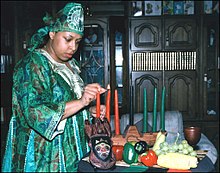Kwanzaa
From Wikipedia, the free encyclopedia
| Kwanzaa | ||||||||
|---|---|---|---|---|---|---|---|---|

2003 Kwanzaa celebration with its founder, Maulana Karenga, and others
|
||||||||
| Observed by | African Americans, parts of African diaspora | |||||||
| Type | Cultural and ethnic | |||||||
| Significance | Celebrates African heritage, unity, and culture. | |||||||
| Celebrations | Unity Creativity Faith Giving gifts |
|||||||
| Date | December 26 to January 1 | |||||||
| Related to | Pan-Africanism | |||||||
History and etymology
Kwanzaa is a celebration that has its roots in the black nationalist movement of the 1960s and was established as a means to help African Americans reconnect with their African cultural and historical heritage by uniting in meditation and study of African traditions and Nguzo Saba, the "seven principles of African Heritage" which Karenga said "is a communitarian African philosophy". For Karenga, a major figure in the Black Power movement of the 1960s and 1970s, the creation of such holidays also underscored an essential premise that "you must have a cultural revolution before before the violent revolution. The cultural revolution gives identity, purpose and direction."[5]
During the early years of Kwanzaa, Karenga said that it was meant to be an "oppositional alternative" to Christmas.[6] However, as Kwanzaa gained mainstream adherents, Karenga altered his position so that practicing Christians would not be alienated, then stating in the 1997 Kwanzaa: A Celebration of Family, Community, and Culture, "Kwanzaa was not created to give people an alternative to their own religion or religious holiday."
Many African Americans who celebrate Kwanzaa do so in addition to observing Christmas.[7]
Principles and symbols
Kwanzaa celebrates what its founder called the seven principles of Kwanzaa, or Nguzo Saba (originally Nguzu Saba—the seven principles of African Heritage), which Karenga said "is a communitarian African philosophy," consisting of what Karenga called "the best of African thought and practice in constant exchange with the world." These seven principles comprise *Kawaida, a Swahili term for tradition and reason. Each of the seven days of Kwanzaa is dedicated to one of the following principles, as follows:- Umoja (Unity): To strive for and to maintain unity in the family, community, nation, and race.
- Kujichagulia (Self-Determination): To define ourselves, name ourselves, create for ourselves, and speak for ourselves.
- Ujima (Collective Work and Responsibility): To build and maintain our community together and make our brothers' and sisters' problems our problems and to solve them together.
- Ujamaa (Cooperative Economics): To build and maintain our own stores, shops, and other businesses and to profit from them together.
- Nia (Purpose): To make our collective vocation the building and developing of our community in order to restore our people to their traditional greatness.
- Kuumba (Creativity): To do always as much as we can, in the way we can, in order to leave our community more beautiful and beneficial than we inherited it.
- Imani (Faith): To believe with all our hearts in our people, our parents, our teachers, our leaders, and the righteousness and victory of our struggle.
seven candles (Mishumaa Saba), a communal cup for pouring libation (Kikombe cha Umoja), gifts (Zawadi), a poster of the seven principles, and a black, red, and green flag. The symbols were designed to convey the seven principles.[8]
Observance

They Endured
Through the degradation of slavery,
They endured.
Their lives were not their own,
but they endured.
When their families were ripped apart,
They endured.
Nothing broke their determination.
Nothing broke their spirit.
Through it all,
They endured!
We must embody their spirit;
Remembering that their strength
and their determination
dwells within us.
Every time we are paralyzed by fear;
Whenever we become weak,
Remember.
When we feel the desire to quit,
Remember
Every time we become discouraged,
Remember.
When we are knocked to our knees,
Remember.
Never surrender to defeat.
Stand tall on your feet.
Keep striving.
Keep believing.
Stand your ground,
and you will abound
Amidst strong winds
Like those to whom we are kin.
It is your duty and mine
To leave something worthwhile behind,
Because through it all,
They endured.
For you and I, they endured.
Thank God, they endured!
copyright Patricia Newman-Harris 2014, Living the Dream
